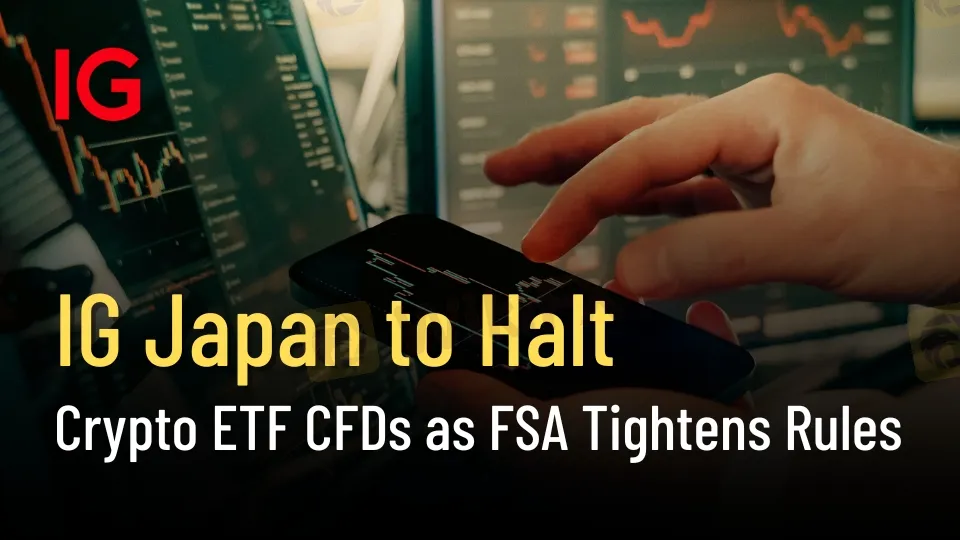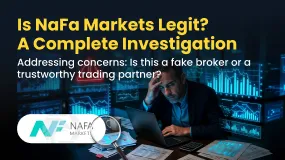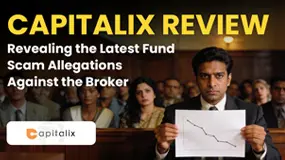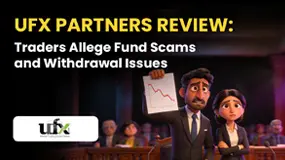Abstract:IG Japan will end cryptocurrency ETF CFDs after new FSA guidance, forcing traders to close positions by January 31, 2026, under stricter crypto rules.

Japans FSA Push Forces IG to Rethink Crypto ETF CFDs
IG Securities Inc., the Japanese subsidiary of London-listed IG Group, is preparing to withdraw cryptocurrency exchange-traded fund contracts for difference from its product lineup, underscoring how quickly regulatory interpretations in Japan can reshape broker offerings.
The move follows updated guidance from Japan‘s Financial Services Agency. In a clarification circulated to market participants earlier this year, the watchdog set out how products referencing overseas cryptocurrency exchange-traded funds should be treated under domestic rules. That clarification has now translated into concrete action at one of Japan’s best-known derivatives brokers.
According to IG Japans notice to clients, the firm will stop accepting new orders for cryptocurrency ETF CFDs from Monday, December 1, 2025. Any resting or pending orders in the affected instruments at the cut-off will be cancelled rather than executed. Existing positions can still be run for a limited time, but traders have been given a hard stop for closing out their exposure.
The broker stressed that the decision is not a discretionary shift in risk appetite but a direct response to the Financial Services Agencys stance on crypto-linked ETFs. IG Japan said the revised policy was assessed through its internal governance framework before it opted to halt new trading in the products.
For investors who had grown used to 24-hour access to crypto ETF price movements through CFDs, the announcement marks a notable change in the trading landscape. It also signals that brokers with cross-border product suites, particularly in digital assets, will have to remain nimble as regulators refine their views.
Why Crypto ETF CFDs Are Now in the Regulatory Firing Line
At the heart of the policy shift is the way the Financial Services Agency now classifies ETFs that hold or track specific crypto assets such as bitcoin or ether. In its explanation, translated from Japanese, the regulator noted that these exchange-traded funds are economically bound to the price of the underlying cryptocurrency. As a result, derivatives tied to such ETFs, including CFDs offered by overseas firms but sold into Japan, are treated as transactions linked to crypto assets.

That distinction matters. Japan operates a dedicated regime for crypto-related derivatives, designed to reflect the high volatility, technology risks, and market-structure quirks of digital assets. Position limits, leverage caps, margining standards, and product approval processes for these instruments tend to be more stringent than for traditional securities or index products.
The Financial Services Agency has also taken a firm line on the creation and sale of crypto asset ETFs themselves. At present, launching and publicly offering ETFs based directly on crypto assets to Japanese investors is effectively prohibited. While crypto exchanges and certain leveraged products operate within a licensing system, spot and ETF structures sit outside what the regulator is prepared to sanction for mass distribution.
Against that backdrop, allowing derivatives based on overseas crypto ETFs to be sold to local clients would cut across the spirit of the current framework. Even if the ETF is domiciled and listed in another jurisdiction, the underlying economic exposure for a Japanese retail customer is still the crypto asset. This is the core reason the agency has signalled that offering CFDs on such ETFs is problematic.
For brokers, the guidance raises practical questions. Global firms often rely on “passporting” their product expertise across multiple regions, adapting margin and disclosure rather than removing products altogether. The latest interpretation from Tokyo suggests that, in crypto at least, the regulator prefers a simpler map: if the reference asset is a crypto asset, any linked derivative must meet crypto-derivative rules or not be offered at all.
Impact on IGs Clients and Crypto ETF Offering in Japan
IG Japan has set a clear timetable for winding down the affected products. From December 1, 2025, no new positions can be opened in the cryptocurrency ETF CFDs, and pending entry orders will be removed. Clients who already hold positions will be allowed to manage and close them during a transition period, but the broker has set a final deadline at the close of trading on Saturday, January 31, 2026.
After that date, any remaining open positions in the affected contracts will be closed automatically at the January 31 closing price. Forced liquidation is a standard tool in brokerage risk management, but publicly signalling it more than a year in advance is designed to give traders ample time to plan exit strategies, adjust hedges, or rebalance portfolios.
Two specific products are in scope: CFDs referencing the iShares Bitcoin Trust ETF and the iShares Ethereum Trust ETF. Both currently trade around the clock on IGs platform, mirroring the near-constant price discovery in underlying crypto markets. Once the wind-down is complete, Japanese clients will no longer be able to speculate on or hedge the price of those ETFs via CFDs with IG Japan.
Other instruments on the platform are expected to continue as normal. Index CFDs, FX, commodities, and non-crypto equity CFDs are not affected by the policy change. That segmentation underscores the targeted nature of the intervention: the regulators concern is focused on instruments where crypto assets sit at the core of the value proposition, even if the immediate reference instrument is an overseas ETF.
For active traders, the loss of crypto ETF CFDs removes one route to regulated exposure that blended familiar ETF branding with leveraged derivatives mechanics. Market participants who preferred the structure over trading on offshore crypto exchanges now have fewer options. Some may shift to licensed domestic crypto exchanges for spot and margin trading; others could reassess whether they want crypto exposure at all in a more constrained environment.
From IG Group‘s perspective, Japan remains an important market for forex and index trading. The group has repeatedly highlighted Asia-Pacific as a growth engine in its results, but it must balance that ambition against compliance in jurisdictions with very different appetites for risk. Japan’s stringent approach to protecting retail investors in digital assets is now directly shaping what global brokers can offer.
The timing of the decision also comes on the heels of IGs own research into crypto investor behaviour in another major market. In a recent survey of more than 500 UK-based crypto holders, 51% of respondents told the trading platform that their primary objective is long-term wealth creation, compared with 27% who are focused mainly on short-term gains. That finding runs counter to the stereotype of crypto trading as purely speculative and short-dated.
The survey also revealed that 33% of participants were investing with retirement in mind, while 18% were putting money into crypto markets to build a deposit for a first home. Among younger investors aged 18 to 24, the tilt toward long-term goals was even more pronounced. For brokers, those data points support the idea that digital assets are gradually being folded into broader financial planning, rather than sitting in a separate speculative bucket.
Japan‘s latest stance on cryptocurrency ETFs and CFDs, however, underlines that regulators remain cautious about the instruments through which that exposure is delivered. While investors may be thinking in decades, supervisors are looking closely at leverage, product complexity, and distribution channels today. As other regulators in Asia and Europe reassess their own frameworks, IG Japan’s retreat from crypto ETF CFDs may prove to be an early signal of where the next wave of policy tightening lands.











